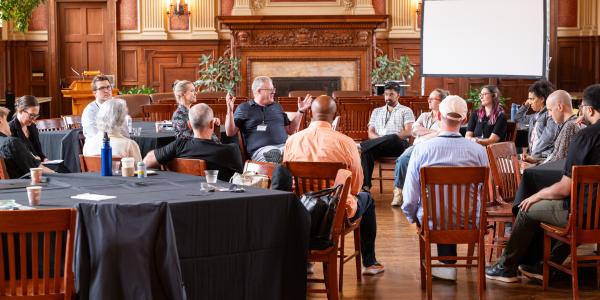The annual Interpolations think tank, hosted at WashU since 2024, explores the interactions of live performance and digital technology — a challenging but rich space for discussion.

While writing his latest musical, “The Last Bimbo of the Apocalypse,” Michael Breslin made a surprising discovery: he related more to the parents in the story than the kids.
At a pivotal moment in “The Last Bimbo,” a distraught mother sings a power ballad, “Stop Scrolling,” imploring a group of TikTok-addled teens to abandon their screens. Breslin, known for incorporating social media slang and subcultures into his work, found himself agreeing with the lyrics as he wrote them.

“I realized it was a little self-help guide to myself that I had placed in the mouth of this villain character,” Breslin said during his keynote address at the 2025 edition of Interpolations, an annual think tank on the performing arts and digital technology, hosted at WashU in September.
Speaking to a multidisciplinary audience of scholars and theater-makers in Holmes Lounge, Breslin described creating “The Last Bimbo” as part of a temporary falling out with internet culture.
“Social media — my once-gay, girlie, punk-rock outlet for self-expression — was actually beginning to diminish everything I held near to myself about myself,” he said. “I took a break from social media. I read novels. I stopped scrolling and looked up into the world. It was moving on, but I was there with it.”
Breslin’s reflection on the allure and pitfalls of the internet sparked broader conversations at Interpolations, which examines the relationship between theater and performance scholarship, the performing arts and digital technologies. Now in its third year, Interpolations debuted at the University of Toronto in 2023.
When funding for the event lapsed after 2023, Assistant Professor of Drama Elizabeth Hunter and WashU’s Immersive Technology Collective stepped in to continue Interpolations in St. Louis for 2024, with additional support from the Performing Arts Department at WashU. A multi-year cluster of the Incubator for Transdisciplinary Futures, the Immersive Technology Collective explores virtual and augmented reality applications across fields, including the performing arts. For 2025, Interpolations was funded by the Doris Duke Foundation, whose president and CEO, Sam Gill, attended the 2023 and 2024 editions.

Hunter frames the central question of Interpolations simply: “How can live performance survive in the 21st century?” The performing arts industry had its “first true existential crisis” during the COVID-19 pandemic, Hunter said. Forced closures of physical performance spaces and rushed digital adaptions caused loss and disruption but few lasting changes in live performance.
“People were trying to make work in social VR, but that is a heavy lift technologically,” Hunter said. “Or they tried to do Zoom theater, which was novel at first, but it ends up being flat before long. There’s a reason those experiments didn’t catch on, even with a captive audience.”
Once the lockdowns lifted, the industry went back to traditional live presentations, but Hunter believes that abandoning pandemic-era experiments entirely would be a missed opportunity.

“Digital technology and digital culture have infused every element of daily life. There’s no opting out,” she said. “At Interpolations, we work on pulling apart the nature of new technologies and what they will mean for theater and performance. Our practitioner colleagues have been at the vanguard of this conversation, but on the scholarly side, we’ve lagged compared to some of our sister disciplines. Part of the goal for Interpolations is to accelerate this discourse.”
Interpolations 2025 featured a roundtable discussion with visiting scholars Sarah Bay-Cheng from the University of Toronto; Christopher Grobe from Johns Hopkins University; theater-maker Jo Cattell; and Zachariah Ezer, an assistant professor of performing arts. Much of the discussion focused on funding — where to find it and how to sustain it.
These conversations highlight the unique role universities can play in preserving the performing arts, Hunter said.
“In a country that does not provide adequate governmental funding to support the performing arts, like the United States, universities are about the only places where artists and scholars can come together in a sustained and impactful way. Universities have facilities, scale, and resources that aren’t replicable elsewhere in the U.S. For me, all three years of Interpolations have validated the role the academy can play in supporting theater and performance studies and practice.”
Hunter said that the event has strategic importance, as well.
“Here at WashU, the Arts & Sciences Strategic Plan advocates ‘pushing boundaries within and among disciplines,’ ‘forging connections between academy and society,’ and ‘harnessing the power of digital transformation’ as necessary investments for a ‘distinctive, world-leading institution’ to make,” Hunter said. “Interpolations is a robust example of how WashU is fulfilling all three of these imperatives. I am grateful that the Doris Duke Foundation, the Incubator for Transdisciplinary Futures, and the Performing Arts Department came together to support this work for 2025.”





